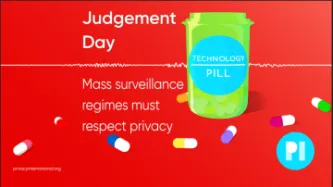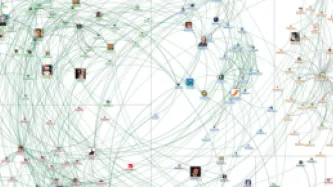Search
Content type: Long Read
In their gold rush to build cloud and AI tools, Big Tech is also enabling unprecedented government surveillance. Thanks to reporting from The Guardian, +972 Magazine, Local Call, and The Intercept, we have insights into the murky deals between the Israeli Government and Big Tech firms. Designed to insulate governments from scrutiny and accountability, these deals bode a dark future for humanity, one that is built using the same tools that once promised a bright, positive world.On 25 September…
Content type: Video
Find out more on our website: https://privacyinternational.org/long-read/4206/qa-eus-top-court-rules-uk-french-and-belgian-mass-surveillance-regimes-must-respect
And make sure we can keep taking these fights to court: support.privacyinternational.org
You can listen and subscribe to the podcast where ever you normally find your podcasts:
Spotify
Apple podcasts
Google podcasts
Castbox
Overcast
Pocket Casts
Peertube
Youtube
Stitcher
And more...
Content type: Impact Case Study
What HappenedOn 5 June 2013, The Guardian published the first in a series of documents disclosed by Edward Snowden, a whistleblower who had worked with the NSA. The documents revealed wide-ranging mass surveillance programs conducted by the USA’s National Security Agency (NSA) and the UK’s Government Communications Headquarters (GCHQ), which capture the communications and data of hundreds of millions of people around the world. In addition to revealing the mass surveillance programs of the NSA…
Content type: Press release
Privacy International today has filed formal complaints with the Organisation for Economic Cooperation and Development (OECD) in the UK against some of the world’s leading telecommunication companies, for providing assistance to British spy agency GCHQ in the mass interception of internet and telephone traffic passing through undersea fibre optic cables.
According to recent reports, BT, Verizon Enterprise, Vodafone Cable, Viatel, Level 3, and Interoute granted access to their fibre optic…
Content type: Press release
Transparency reports have traditionally played a critical role in informing the public on the lawful access requests made by governments to companies like Facebook. These reports have provided a useful accountability mechanism for users to know what governments are asking for and how often. Transparency reports also inform users as to what intermediaries are doing to protect their privacy when it comes to sharing data with governments. Given Facebook's ever-growing presence in the lives of…
Content type: Press release
Google's latest Transparency Report, released at 3pm GMT this afternoon, shows that requests by European governments for the browsing history, email communications, documents and IP addresses of Google's users have skyrocketed since the Transparency Report was launched three years ago. Countries in the European Union made 7,254 requests about 9,240 users or accounts between July and December 2012, averaging over 1,200 requests a month. This represents over a third of all requests made by…
Content type: News & Analysis
Mass surveillance affects us all
The draft Communications Data Bill - known as the 'Snoopers' Charter' - will dramatically expand police surveillance powers if it is voted into law. Innocent citizens would have all their communications and online activity monitored, all of the time. The government would store information about who we're texting, what we're searching for on Google and who we're friends with on Facebook. Police and HM Revenue and Customs officers would be able to access this…
Content type: Press release
The government today published a draft version of a bill that, if signed into law in its current form, would force Internet Service Providers (ISPs) and mobile phone network providers in Britain to install 'black boxes' in order to collect and store information on everyone's internet and phone activity, and give the police the ability to self-authorise access to this information. However, the Home Office failed to explain whether or not companies like Facebook, Google and Twitter will be…
Content type: Press release
An internal Liberal Democrat briefing on Home Office plans to massively expand government surveillance was today passed to Privacy International. The document contains significant evasions and distortions about the proposed 'Communications Capabilities Development Programme' (CCDP), and is clearly intended to persuade unconvinced Lib Dem MPs to vote in favour of the proposal.
The document contains a section entitled 'Remember, under Labour' consisting of a list of the previous government's…
Content type: News & Analysis
For the past couple of months we have been discussing with Google their transparency plans regarding governments accessing data held by Google. Last week Google released initial data on how many requests for data were coming from which governments.
We congratulate Google on this first step, and we believe that by seeking answers to some additional questions, greater clarity may yet emerge. Of course we have many more questions. We hope that this is the first step in an ongoing dialogue with…
Content type: News & Analysis
The European Commission is about to announce the compulsory fingerprinting of all visitors to the EU, both visa holders and non-visa holders, along with automated border checks of EU nationals through the analysis of fingerprints and facial scans.
The Communication from December 2007, available here on the PI site, outlines the plans. Below we summarise the plans. Also see PI's commentary in the Guardian CommentisFree section from February 11, 2008.
Critical Analysis
The Communication does…




